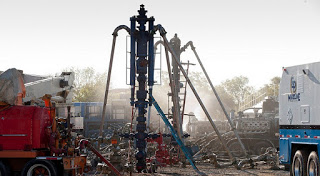The EPA released findings of its study on the impact of fracking on drinking water resources, but derelict reporting by corporate media has utterly failed the public. Several mitigating factors in the purported “landmark” investigation have been so blatantly and conspicuously ignored by mainstream press that it is arguable the true findings haven’t been disclosed at all.
To be fair, some outlets do, indeed, cover the ostensible facts about the EPA’s study in noting that fracking does pose a small, but non-systemic risk to the water supply. This is evidenced in the New York Times: “Fracking Has Not Had Big Effect On Water Supply, EPA Says While Noting Risks,” or the technically correct but misleading headline from NPR: “EPA Finds No Widespread Drinking Water Pollution From Fracking.” Some, however, seem to have altogether eliminated what didn’t suit their agenda, as the Washington Times touts: “EPA: Fracking Doesn’t Harm Drinking Water” or Politico’s: “EPA: Fracking’s No Big Threat To Water.”
Indeed, all of these outlets have two major things in common: they’re all correct and yet they all leave out critical information necessary to properly assess the EPA’s findings.
There are notable conclusions by the EPA in its “Assessment of the Potential Impacts of Hydraulic Fracturing for Oil and Gas on Drinking Water Resources,” which should not be understated. “From our assessment, we conclude there are above and below ground mechanisms by which hydraulic fracturing activities have the potential to impact drinking water resources,” states the report.
However, these mechanisms did not lead to any evidence of “widespread, systemic impacts” on those resources. As many suspected, the contamination found was due to water withdrawals in areas or times of low water availability, fracking chemical and wastewater spills, drilling directly into underground resources, subterranean migration of such fluids and gas (as was discovered recently in a study published in PNAS), and inadequate treatment of wastewater.
Essentially, what many have suspected all along has a basis in scientific fact—even though the research indicates this isn’t a universal and widespread problem. You might be asking where the issue with corporate media reporting comes into play since this is almost exactly what they claimed. Simply stated, it’s all in the details.
To reach their conclusions, the EPA did not investigate, collect evidence, or test in the field, but instead aggregated the reports and research of others for analysis. Although this is a perfectly acceptable practice, the shaky availability and reliability of information from one group on which they depended means pivotal information was either incomplete or lacking entirely.
At issue is the EPA’s fairly significant dependence on the FracFocus Chemical Disclosure Registry for an account of which chemicals are employed in the fracking process. Well operators in some states are required by regulation to disclose their chemical mixtures and some are not, but either way, FracFocus disclosures are not only voluntary, but also subject to proprietary conditions. If the compound is considered a trade secret, it will remain unknown and unreported to the site. As the EPA study fact sheet states:
Part of this effort includes analyzing data from [FracFocus] to better understand the chemicals and water used to hydraulically fracture oil and gas production wells in the United States. Oil and gas production well operators can disclose information at this website about ingredients and water used in hydraulic fracturing fluids […]. [emphasis added]
 It is this very system of voluntary reporting that has so frustrated environmental activists and concerned scientists wishing to have an understanding of fracking’s full impact on water resources—the exact subject of the EPA report. This dilemma is fleshed out in the same fact sheet’s “Limitations” section:
It is this very system of voluntary reporting that has so frustrated environmental activists and concerned scientists wishing to have an understanding of fracking’s full impact on water resources—the exact subject of the EPA report. This dilemma is fleshed out in the same fact sheet’s “Limitations” section:
The [EPA] project database represents the data reported to FracFocus rather than all hydraulic fracturing that occurred in the US during the study time period.” So that database “is an incomplete picture” of all fracking “due to the voluntary reporting in some states, the omission of [proprietary] information from disclosures” and “invalid or erroneous information […] found in the original disclosures. [emphasis added]
In other words, Congress ordered the EPA to conduct an extensive investigation, but because the agency did not have any unusual or unprecedented access to detailed information, its findings—though suggestive—must perforce be incomplete. Individual instances of fracking wells impacting the water supply may be partially noteworthy, but without uncensored and unfettered access to the exact chemicals employed by the industry, the impact cannot be fully appraised. With “688 unique ingredients (i.e., chemicals) […] reported by 428 operators in 20 states” and a “median number of added ingredients per disclosure” totaling 14 divulged by the study, there are necessary questions about the extent of the effects produced by the unpublished ingredients.
So why was the EPA’s study reported as groundbreakingly complete?
It seems mainstream media is seeking to side with the powerfully wealthy oil and gas industry by offering a final, definitive answer to the public’s obviously justified doubts surrounding fracking—because: corporate ownership. Though the EPA did not find systemic impact, the incontrovertibly flawed database could not possibly have done so. For media at large to present findings as unarguably conclusive when so much remains unknown is entirely disingenuous and moderately irresponsible.
Fracking is the industry in desperate need of transparency as water becomes an exceedingly precious commodity. Mainstream media does us no favors in its whitewash of what little—and crucial— conclusions we have at our disposal.
Claire Bernish writes for theAntiMedia.org, where this first appeared. Tune in! Anti-Media Radio airs Monday through Friday @ 11pm Eastern/8pm Pacific. Help us fix our typos:edits@theantimedia.org.


Be the first to comment on "How Corporate Media Whitewashed the EPA’s Fracking Study"